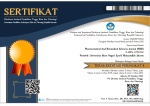Hubungan Sosiodemografi Pasien dengan Pengetahuan Pasien tentang Pelayanan Informasi Obat menggunakan Telefarmasi (E-Pharmacy)
Abstract
Keywords
References
PERMENKES. 2021. Peraturan Menteri Kesehatan Republik Indonesia Nomor 14 Tahun 2021 tentangStandar Kegiatan Usaha dan Produk Pada Penyelenggaraan Perizinan Berusaha Berbasis Risiko Sektor Kesehatan.
Muflih, S. M., Al-Azzam, S., Abuhammad, S., Jaradat, S. K., Karasneh, R., & Shawaqfeh, M. S. Pharmacists’ experience, competence and perception of telepharmacy technology in response to COVID-19. International Journal of Clinical Practice 2021: 75(7).
.
KEMENKES. 2016. Kementrian Kesehatan Republik Indonesia (2016) Peraturan Menteri Kesehatan Republik Indonesia Nomor 72 Tahun 2016 Tentang Standar Pelayanan Kefarmasian.
KEMENKES. 2019. Kementrian Kesehatan Republik Indonesia 2019 Petunjuk Teknis Standar Pelayanan Kefarmasian di Rumah Sakit.
Putri, W. U., & Wicaksono, Imam. A. Review Artikel: Pelayanan Telefarmasi di Masa Pandemi Covid-19. Farmaka 2021: 19(3), 93–102.
Poudel, A., & Nissen, L. Telepharmacy: a pharmacist’s perspective on the clinical benefits and challenges. Integrated Pharmacy Research and Practice 2016: Volume 5, 75–82.
Gobel, N. Gambaran Tingkat Kepuasan Pasien Terhadap Pelayanan Kefarmasian di Rumah Sakit. Indonesian Journal of Pharmaceutical Education (e-Journal) 2022: 2(2), 2775–3670.
Baldoni, S., Amenta, F., & Ricci, G. Telepharmacy services: Present status and future perspectives: A review. In Medicina (Lithuania) 2019: 55(7). MDPI AG.
Tjiptoatmadja, N. N., & Alfian, S. D. Knowledge, Perception, and Willingness to Use Telepharmacy Among the General Population in Indonesia. Frontiers in Public Health 2022: 10.
Yulia, P. R., Baga, L. M., & Djohar, S. Kepuasan Konsumen Terhadap Pelayanan Apotek dan Tingkat Pengetahuan Konsumen mengenai Standar Pelayanan Kefarmasian yang Berlaku (Studi Kasus di Kota Depok). Jurnal Aplikasi Bisnis Dan Manajemen 2016: 2(3), 312–322.
Ayu WD. Supervisi Keperawatan. Cirebon: Rumah Pustaka: 2022.
Budiman & Riyanto A. Kapita Selekta Kuesioner Pengetahuan dan Sikap dalam Penelitian Kesehatan. Jakarta: Salemba Medika: 2013.
Notoatmodjo S. Pendidikan dan Perilaku Kesehatan. Jakarta: Rineka Cipta: 2018.
Nursalam. Metodologi Penelitian Ilmu Keperawatan: Pendekatan Praktis. Jakarta: Salemba Medika: 2016.
Purba R. Pengetahuan dan Sikap Perawat terhadap Penggunaan Alat Pelindung Diri (APD). Bandung: Media Sains Indonesia: 2021.
DOI: 10.15408/pbsj.v6i1.31900
Refbacks
- There are currently no refbacks.






